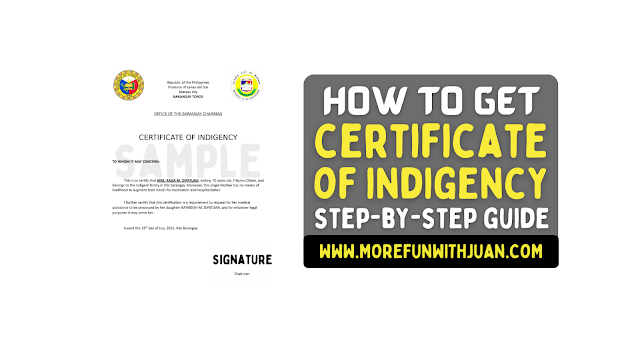In the Philippines, a Certificate of Indigency serves as an essential document for individuals and families who may be experiencing financial hardship.
This certificate, issued by the local government unit (LGU), helps qualifying individuals access various government programs, services, and benefits aimed at providing assistance and support to those in need.
In this article, we'll guide you through the process of obtaining a Certificate of Indigency in the Philippines.
Understanding the Certificate of Indigency
A Certificate of Indigency, also known as a Certificate of Poverty, is a document that attests to an individual's or family's financial status, particularly their inability to meet basic needs due to limited financial resources. This certificate is a prerequisite for availing of various government services and benefits, such as:
- Healthcare Assistance: Access to government health programs and subsidies for medical expenses.
- Educational Assistance: Enrollment in scholarship and financial aid programs for education.
- Social Welfare Programs: Eligibility for social welfare programs, such as the Pantawid Pamilyang Pilipino Program (4Ps).
- Housing Assistance: Priority in government housing programs and subsidies.
Eligibility for a Certificate of Indigency
The criteria for eligibility may vary slightly from one LGU to another. However, in general, individuals or families who meet the following conditions may qualify for a Certificate of Indigency:
- Income Level: The applicant's income must fall below the poverty threshold set by the LGU. This threshold varies depending on the LGU's local economic conditions.
- Assets: The applicant must not possess significant assets or properties that can provide for their basic needs.
- Residency: The applicant typically needs to be a resident of the LGU where they are applying for the certificate.
Steps to Obtain a Certificate of Indigency
Obtaining a Certificate of Indigency involves several steps, and the exact process may vary from one LGU to another. However, the following steps provide a general overview of the process:
STEP ONE: Visit the Barangay Hall
- Start by visiting the barangay (local neighborhood) hall in your community.
- This is typically where you'll apply for the Certificate of Indigency.
STEP TWO: Inquire and Collect Requirements
- Inquire with the barangay staff about the specific requirements and documents needed for the application.
- These may include proof of income, proof of residency, and a valid ID.
STEP THREE: Complete Application Forms
- Fill out the necessary application forms provided by the barangay staff.
- Ensure that you provide accurate and complete information.
STEP FOUR: Document Verification
- The barangay staff will review your application and supporting documents to determine your eligibility for the certificate.
STEP FIVE: Interview
- In some cases, you may be required to participate in an interview with a social worker or barangay official to assess your financial situation.
STEP SIX: Certificate Issuance
- If you meet the eligibility criteria, the barangay will issue you a Certificate of Indigency.
- This certificate is typically free of charge.
ATTRACTIONS TO SEE IN MANILA
Klook.comWhere to Use the Certificate of Indigency
You can use the Certificate of Indigency to avail yourself of various government services and benefits, as mentioned earlier.
Renewal and Validity
The validity period of a Certificate of Indigency may vary by LGU, but it often needs to be renewed annually or as required by the specific government program you are applying for. To renew your certificate, you will typically need to revisit the barangay hall, provide updated information, and undergo reevaluation of your eligibility.
Obtaining a Certificate of Indigency in the Philippines is a valuable step for individuals and families facing financial challenges. It opens doors to essential government assistance programs, ensuring that those in need can access vital services and support to improve their quality of life.
If you are in need of such assistance, don't hesitate to reach out to your local barangay to start the application process for a Certificate of Indigency.














No comments
Let us know your thoughts!